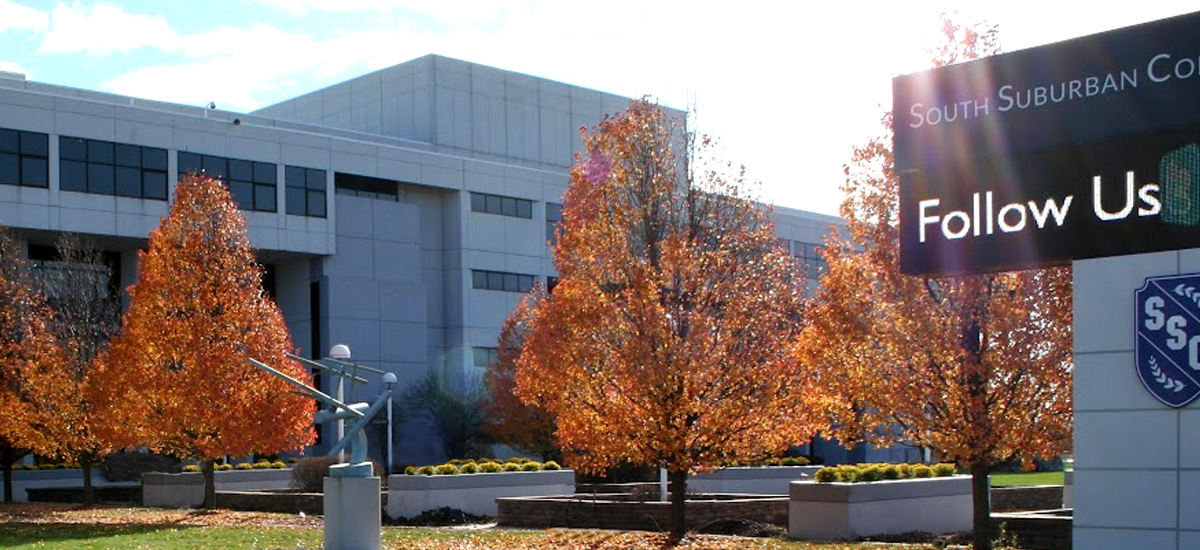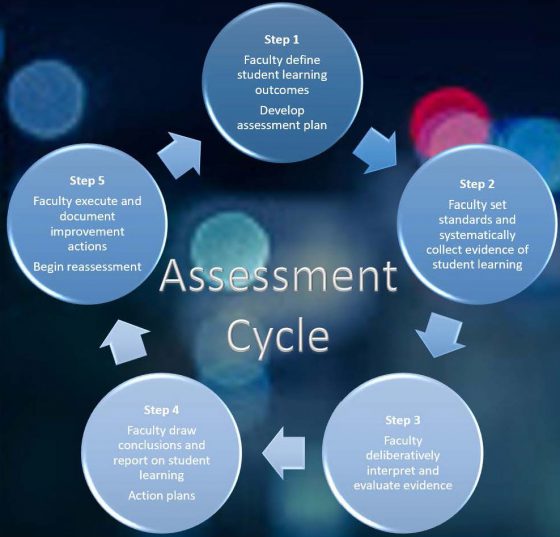
Outcomes Assessment Mission Statement
The mission of the Outcomes Assessment Committee at South Suburban College is to promote faculty produced assessment plans which support dynamic assessment tools, fostering student learning and academic growth.
Outcomes Assessment Vision Statement
Outcomes assessment at SSC is a set of collaborative and data-driven endeavors embraced and supported by all faculty for the benefit of students.
2022-23 OA Unit Coordinator Team
Dr. Ona Johnson
Business & Technology:
Dr. Megan Tabag
Social and Behavioral Sciences & Legal Studies:
Dr. Jennifer Medlen
Math, Physical Sciences & Life Sciences
Naomi West
Nursing & Allied Health
Lakesha Jefferson
English, Communication & Fine Arts
Millicent Collier
Co-curricular
Becky Walters, J.D.
Chair
General Education Rubrics
For rubric creation and attachment tutorials, use the
Teaching and Learning OUTCOMES ASSESSMENT web page about rubrics.
Outcomes Assessment Master Plan
General Education Outcomes Assessment Timeline
- This is a three-year cycle of pairs of Gen Ed areas
- All reports will be sent and stored in D2L.
- OAC will provide templates for data form, reports, and action plans to faculty.
- Some faculty will only be doing Gen Ed assessment rather than Course-Level assessment as a result of this cycle. (See Course Map and department chairs for identified courses.)
General Education Area Pairs:
- YEAR 1 Written Communication and Technology
- YEAR 2 Oral Communication, Critical Thinking, & Multiculturalism
- YEAR 3 Research Methodology
| Faculty Assesses Outcomes | Faculty Analyzes Outcomes | Faculty Creates Action Plans to Improve Teaching |
|---|---|---|
| Fall 2021/Spring 2022 | Fall 2022 | Spring 2023 |
| Technology Written Communication Completed SP 2022 |
Technology Written Communication Completed FA 2022 |
Technology Written Communication Completed SP 2023 |
| Fall 2022/Spring 2023 | Fall 2023 | Spring 2024 |
| Oral Communication Critical Thinking Multiculturalism This Year |
Oral Communication Multiculturalism Critical Thinking |
Oral Communication Multiculturalism Critical Thinking |
| Fall 2023/Spring 2024 | Fall 2024 | Spring 2025 |
| Research Methodology | Research Methodology | Research Methodology |
| Fall 2024/Spring 2025 | Fall 2025 | Spring 2026 |
| Technology Written Communication |
Technology Written Communication |
Technology Written Communication |
| Fall 2025/Spring 2026 | Fall 2026 | Spring 2027 |
| Oral Communication Critical Thinking |
Oral Communication Critical Thinking |
Oral Communication Critical Thinking |
Assessment Cycle

STEP 1
Faculty define student learning outcomes.
Develop assessment plan
STEP 2
Faculty sets standards and systematically collect evidence of student learning.
STEP 3
Faculty deliberatively interpret and evaluate the evidence.
STEP 4
Faculty draw conclusions and report on student learning.
Action plan
STEP 5
Faculty execute and document improvement actions.
Begin reassessment
General Education Objectives
In an effort to ensure the measurability of the general education objectives, the department chairs have revised many of the objectives. In addition, departments have also aligned their course objectives with the overall general education objective of the college. The revised General Education Objectives included below.
G1 – The student will demonstrate critical thinking through written, oral or skill-based activities.
G2 – The student will argue with insight, intelligence, eloquence and responsibility.
G3 – The student will express oneself with discipline and creativity.
G4 – The student will demonstrate an understanding of discipline specific material and how it interrelates with other subjects.
G5 – The student will recognize the existence of a multi-cultural society and demonstrate an appreciation of multiple perspectives.
G6 – The student will evaluate the impact of science and technology on the individual, society and the natural world.
C1 – Students will compose written English in a grammatically correct, well-organized and coherent manner for a variety of purposes.
C2 – Students will compose, develop and deliver effective, English, language-based oral presentations for a variety of purposes.
C3 – Students will demonstrate an understanding of the various forms of rhetoric.
C4 – Students will integrate library/research skills into various areas of study.
M1 – Students will demonstrate analytical, quantitative, and problem-solving skills.
M2 – Students will integrate mathematical relationships with other fields of study.
H1 – Students will identify and analyze ideas, movements, civilizations and cultures.
H2 – Students will critically assess and express ideas about cultural diversity and individual roles in society.
FA1 – Students will apply aesthetic reasoning for the expression, analysis, and interpretation of art forms.
FA2 – Students will express themselves by creating or performing works of verbal or non-verbal Art.
PS1 – Students will demonstrate an ability to effectively use scientific terminology.
PS2 – Students will apply fundamental scientific conceptual frameworks for understanding and evaluating natural phenomena and their causes and effects.
T1 – Students will demonstrate the use of a variety of forms of technology as fundamental tools.
T2 – Students will demonstrate the effective application of current computers and software to a particular field of study.
Power Points to Assist Faculty
FALL 2022 Faculty Development Presentation (Day 1)
FALL 2022 Faculty Development Presentation (Day 2)
SPRING 2023 Faculty Development Presentation
Suggestions
If an instructor is teaching multiple sections of the same course in a semester, it is encouraged to submit assessment scores for the same activity for all of the sections. The more data we have at our disposal the better the subsequent analysis. Within a department, rubric data across several sections of the same course could be utilized in the preparation of departmental annual updates.
If you have comments or suggestions for the Outcomes Assessment team at SSC, fill out and submit this form.
